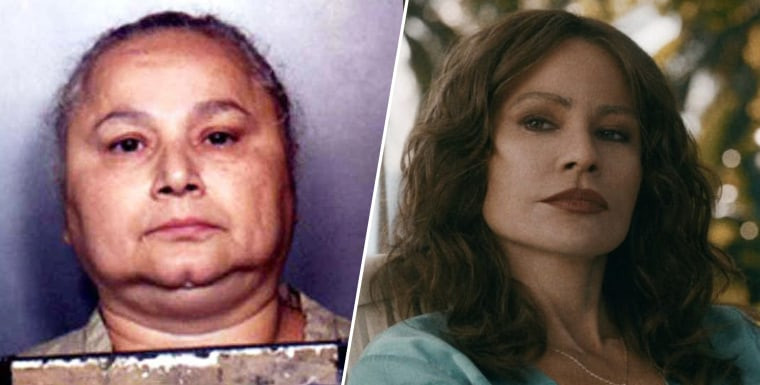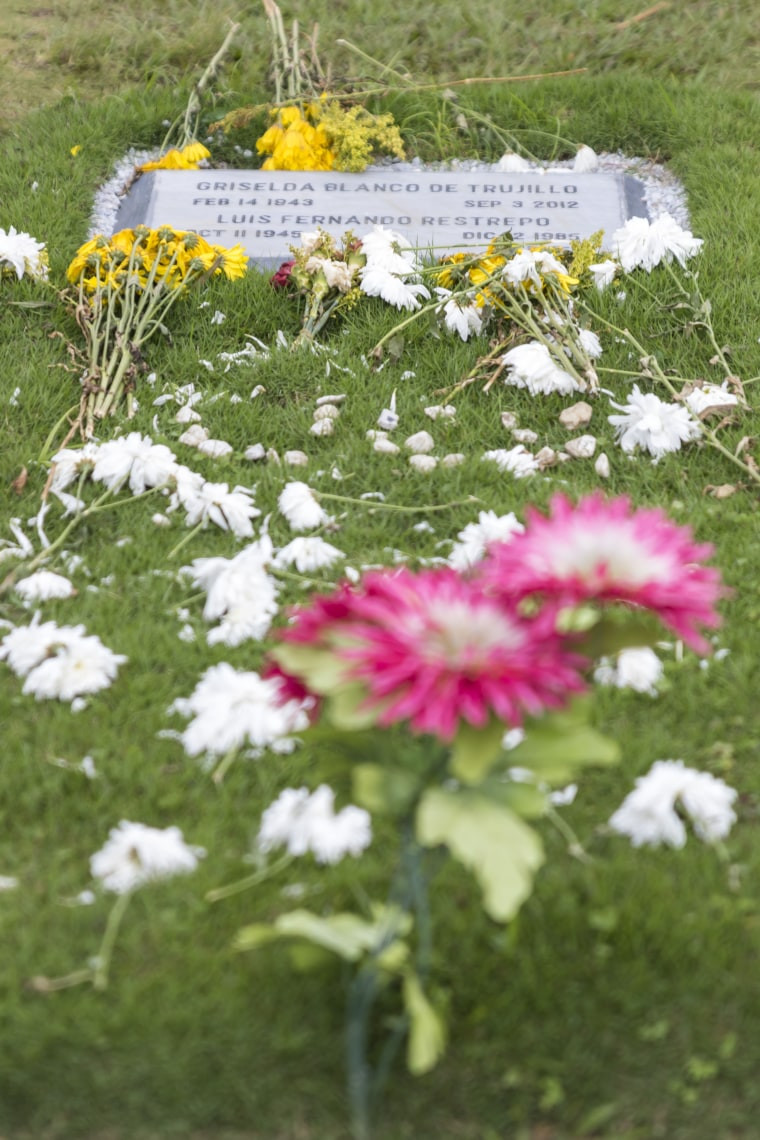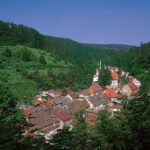Netflix’s gripping series “Griselda,” starring Sofía Vergara, has reignited global interest in the notorious “Cocaine Godmother,” Griselda Blanco. As viewers become engrossed in her fictionalized dramatization, a key question emerges: Where Is Griselda Blanco Now? This article delves into the factual details of Griselda Blanco’s life, death, and final resting place, separating truth from fiction and providing a comprehensive understanding of her ultimate fate.
Sofía Vergara herself was captivated by the dichotomy of Blanco’s character, telling the New York Times, “This innocuous-looking woman was raising four kids while building this insane, brutal empire.” This duality is central to understanding the enduring fascination with Griselda Blanco, a woman who thrived in the male-dominated world of drug trafficking.
 Griselda Blanco and Sofia VergaraSofia Vergara portrays Griselda Blanco in the Netflix series ‘Griselda’, highlighting the dramatization of the Cocaine Godmother’s life.
Griselda Blanco and Sofia VergaraSofia Vergara portrays Griselda Blanco in the Netflix series ‘Griselda’, highlighting the dramatization of the Cocaine Godmother’s life.
While the Netflix series takes creative liberties, executive producer Doug Miro emphasized the importance of capturing the “emotional truth” of Griselda Blanco’s life. He noted the challenges in definitively documenting her history, stating, “It’s hard with Griselda, as it is with a lot of these narcos — not as much was written about them as Pablo (Escobar).” This makes understanding the verifiable facts of her life, especially her end, all the more crucial.
Nelson Andreu, a former West Miami police chief who dedicated a decade to building a case against Blanco, expressed skepticism about Hollywood’s portrayal. He told TODAY.com, “They’re not going to portray her as she really was. They never do in movies. They make what they think is going to sell and what people are going to like. Very close to the truth, but not the truth.” To discern the truth about where Griselda Blanco is now, we must look beyond the dramatization and examine the documented facts of her life’s conclusion.
Who was Griselda Blanco? The Rise of the “Cocaine Godmother”
Griselda Blanco was a Colombian drug lord who pioneered large-scale cocaine smuggling into the United States, specifically Miami, during the 1970s and 80s. Her ruthless approach earned her the chilling moniker “Cocaine Godmother.” Andreu described her as utterly unscrupulous, stating, “She would kill you if she owed you money and didn’t want to pay you. And if you owed money and couldn’t pay her, she would kill you as well. It was a win-win for her and a lose-lose for everyone else.”
Her extreme behavior was partly attributed to her unique position as a woman in a male-dominated criminal underworld. As Andreu explained, “She had to be the way she was because she was the only woman in a man’s business. There were no other women in that high of a capacity dealing cocaine at the time.”
Blanco’s criminal empire eventually led to her indictment in the United States in 1985 for conspiracy to traffic cocaine. She was arrested and sentenced to 15 years in prison. Later, facing murder charges in Florida, a scandal involving her hitman Jorge Ayala and state attorney’s office secretaries complicated the legal proceedings. Despite this, Blanco ultimately pleaded guilty to second-degree murder in 1998 and received three concurrent 20-year sentences. She was released and deported to Colombia in 2004 after spending years behind bars.
Griselda Blanco’s Death: A Violent End in Medellín
Griselda Blanco’s reign of terror did not conclude with her imprisonment. In September 2012, at the age of 69, Griselda Blanco was assassinated in Medellín, Colombia. The Miami Herald and NBC News confirmed her death through Colombian national police reports.
The Guardian reported the chillingly fitting nature of her demise: “The manner of Griselda Blanco’s death on Monday reflected the brutality for which she became notorious — gunned down in the street by a killer on a motorcycle.” This execution-style killing mirrored the violent tactics she herself was known for, suggesting a poetic, albeit grim, justice.
Bruce Bagley, then head of the University of Miami’s Department of International Studies, commented on her death to The Guardian, calling it “some kind of poetic justice.” He added, “She might have retired to Colombia and wasn’t anything like the kind of player she was in her early days, but she had lingering enemies almost everywhere you look.” Even in retirement, Griselda Blanco could not escape the violent repercussions of her past.
Where is Griselda Blanco Buried? Her Final Resting Place
So, where is Griselda Blanco now, in a literal sense? She is buried in the Jardines de Montesacro cemetery in Medellín, Colombia. This information was reported by the Spanish daily newspaper El País. Interestingly, she shares this final resting place with another infamous Colombian drug lord: Pablo Escobar.
 Jardines de Montesacro cemeteryThe Jardines de Montesacro cemetery in Medellin, Colombia, is the final resting place of Griselda Blanco, the notorious ‘Cocaine Godmother’.
Jardines de Montesacro cemeteryThe Jardines de Montesacro cemetery in Medellin, Colombia, is the final resting place of Griselda Blanco, the notorious ‘Cocaine Godmother’.
The Jardines de Montesacro cemetery has become a site of morbid curiosity, attracting tourists interested in the legacies of both Blanco and Escobar. Their adjacent burials underscore the intertwined narratives of drug trafficking and violence that plagued Colombia for decades.
The Fate of Her Sons and Blanco’s Enduring Legacy
As depicted in “Griselda,” Blanco had four sons. Tragically, her three eldest sons preceded her in death, victims of the violent world she inhabited. Osvaldo Trujillo-Blanco, one of her older sons, was killed outside a nightclub in Colombia in 1992, as documented by the U.S. Department of Justice Office of the Inspector General.
However, her youngest son, Michael Corleone Blanco, is still alive. He embraces his mother’s controversial legacy, identifying himself as the “proud son of Griselda Blanco” on his lifestyle brand’s website.
Griselda Blanco’s life, though brutally violent, has cemented her place in popular culture. Beyond the current Netflix series, she was featured in documentaries like “Cocaine Cowboys” and “Cocaine Cowboys 2: Hustlin’ with the Godmother.” Catherine Zeta-Jones also portrayed her in the 2017 Lifetime movie “Cocaine Godmother.” These portrayals, culminating in Netflix’s “Griselda,” ensure that the story of the “Cocaine Godmother” continues to captivate and disturb audiences.
In conclusion, while the Netflix series “Griselda” offers a dramatized interpretation of her life, the factual answer to “where is Griselda Blanco now?” is definitively in the Jardines de Montesacro cemetery in Medellín, Colombia. Her story serves as a stark reminder of the devastating impact of the drug trade and the violent lives it consumed, including that of Griselda Blanco herself.


